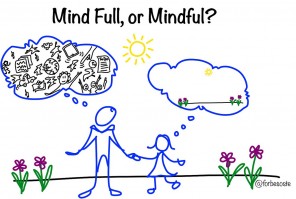Meditation and Psychotherapy – Do They Work Together?

By: alan jones
by Andrea M. Darcy
Meditation has come a long way in the last few decades. Now practised by business sorts and bohemians alike, it is used in schools, prisons, and major companies. Meditation was even introduced in Parliament here in the UK.
But is mediation really suited to be part of psychotherapy? What sort of meditation do psychotherapists use, anyway? And how can it boost your results from attending therapy?
What sort of meditation are we talking about?
Meditation wears many hats these days. From the transcendental meditation that was all the rage in the seventies, to traditional practises like zazen meditation and Qi gong and modern Western upstarts like “heart rhythm mediation”, it can all seem overwhelming and a bit ‘out there’.
Psychotherapy, however, tends to use a practical and evidence-based modern reworking of meditation called mindfulness. Originally started by Dr. Jon Kabat-Zinn in the late seventies as Mindfulness-based stress reduction (MBSR), it distills the elements of traditional Eastern relaxation practices into a format that best helps our modern lifestyles.
The aim of mindfulness meditation to help you be aware of your thoughts and bodily sensations in a way that helps you cope better with your emotions and challenges. The main tools it uses for this are breath awareness and body scanning, which means drawing the attention to the body and noticing where there is a possibility to release held tension.
How did meditation and psychotherapy meet? Aren’t they very different things?
 Originally, yes. A few decades ago, if a psychotherapist told his or her colleagues they were practicing Buddhist meditation, they might have met with raised eyebrows.
Originally, yes. A few decades ago, if a psychotherapist told his or her colleagues they were practicing Buddhist meditation, they might have met with raised eyebrows.
Freud wrote that the feeling of “oceanic” oneness meditators seek was nothing but “another way taken by the ego of denying the dangers it sees threatening it in the external world”.
With the deepest respect to Freud, times have changed. And so has our understanding of the brain and the interaction between what we think, act, and feel.
It’s now understood that modern day stress can severely affect our thinking and our moods, and that meditation counteracts stress and helps us be more aware of what is going right in our lives.
What issues is mindfulness meditation in psychotherapy useful for?
- Stress (including workplace stress)
- Anxiety
- Depression
- Distraction/ ADHD
- Self-esteem
- Borderline personality disorder
- Anger management problems
- Midlife crisis
- Bereavement
- Sleep problems
- Addictions
What results can I expect from meditation in conjunction with therapy?
As well as helping you with any of the issues stated above, meditation can offer you the following results:
1. A clearer and more productive mind.

By: nicksmirni
Meditation helps you to have awareness of the patterns of your mind and teaches you how to stay in the present instead of always being caught up with anxiety about the past and worries about the future.
By helping you ‘catch’ your thoughts, you can start to decide what thoughts you want to respond to and what thoughts are just your inner critic or inner drama queen having its say. You can also start choosing what thoughts you want to now have.
2. A less reactive approach to life.
Meditation helps you become more aware of yourself and what is actually happening around you. When you are more available to the present moment instead of distracted by your worries and anxieties, you are more able to choose your actions instead of just thoughtlessly reacting in ways you soon regret.
3. Greater understanding of self.
Being aware of your thoughts and recognising that your thoughts are often just thoughts, not who you are, is incredibly empowering. Meditation will help you become increasingly aware of the you waiting beneath the mental chatter, and that ‘you’ can be a pleasant surprise.
4. Appreciation for life.
Meditation makes you aware of what is actually going on in your life instead of what you had been telling yourself had been going on. It helps you start to notice what is working for you, instead of just what is going wrong. And by being present, you might find others respond to you in new ways that help you appreciate them more, and, perhaps more importantly, appreciate youreslf more.
What sorts of psychotherapists use mindfulness meditation during sessions?
All kinds of therapists now integrate basic mindfulness into their practise, regardless of their theoretical background or certification. It’s simply a matter of asking for one who does when you book your first session, or if you are already working with a therapist, asking if they are trained at using mindfulness and letting them know you’d like to try.
 But there are some forms of psychotherapy that have mindfulness-based meditation as a core component of their structure. These include:
But there are some forms of psychotherapy that have mindfulness-based meditation as a core component of their structure. These include:
- Dialectical Behaviour Therapy
- Mindfulness Based Cognitive Therapy (MBCT)
- Acceptance and Commitment Therapy.
How does meditation fit into a therapy session?
There is no exact way a therapist must use meditation, so it will depend on both your therapist and on the form of psychotherapy or counselling they are offering.
An integrative therapist, for example, might offer meditation as something to explore only if it seemed relevant for the client. If a client was, say, experiencing anxiety and also a lack of fulfilment in life they couldn’t explain, the therapist might suggest a ten-minute meditation in the middle of a session or towards the end of one.
If the client perhaps bypassed an uncomfortable feeling during the session, the meditation could be used as a way to access what is really going on for them by paying attention to their thoughts and physical sensations during it.
Working with a cognitive behavioural therapy (CBT) practitioner, it might be a more prescriptive part of sessions. This would depend on what issues you present in your first few sessions and what you and your therapist decide to work on. Meditation might be used at certain times in every session or might be given as homework, such as listening to certain CDs or attending a meditation group between your appointments.
Great. I want to try it. What do I do?
Don’t assume that just because a therapist isn’t advertising meditation as part of what they offer it’s not a tool they can offer you. If you find a therapist you think might be right for you, call and ask if they do integrate mindfulness as a therapeutic tool, as many have taken mindfulness training nowadays.
If you like the sounds of mindfulness so much you want it to be a large part of your therapy experience, then book with a practitioner of one of the mindfulness based practises above.
And if you just want to try mindfulness by itself, such is the popularity of the movement major cities offer classes nowadays.
Interested in trying mindfulness-based therapy? We connect you with highly experienced MBCT therapists in central London offices.
Photos by Mel, Joe Shiabotnik, Intel Free Press, Heidi Forbes Oste
 Andrea M. Darcy is a mental health and wellbeing expert and writer. She loves to take difficult concepts and make them easy for anyone to understand. Meditation has been the most transformative tool of her life, she’s done it for over 20 years now! Find her on Instagram @am_darcy
Andrea M. Darcy is a mental health and wellbeing expert and writer. She loves to take difficult concepts and make them easy for anyone to understand. Meditation has been the most transformative tool of her life, she’s done it for over 20 years now! Find her on Instagram @am_darcy




